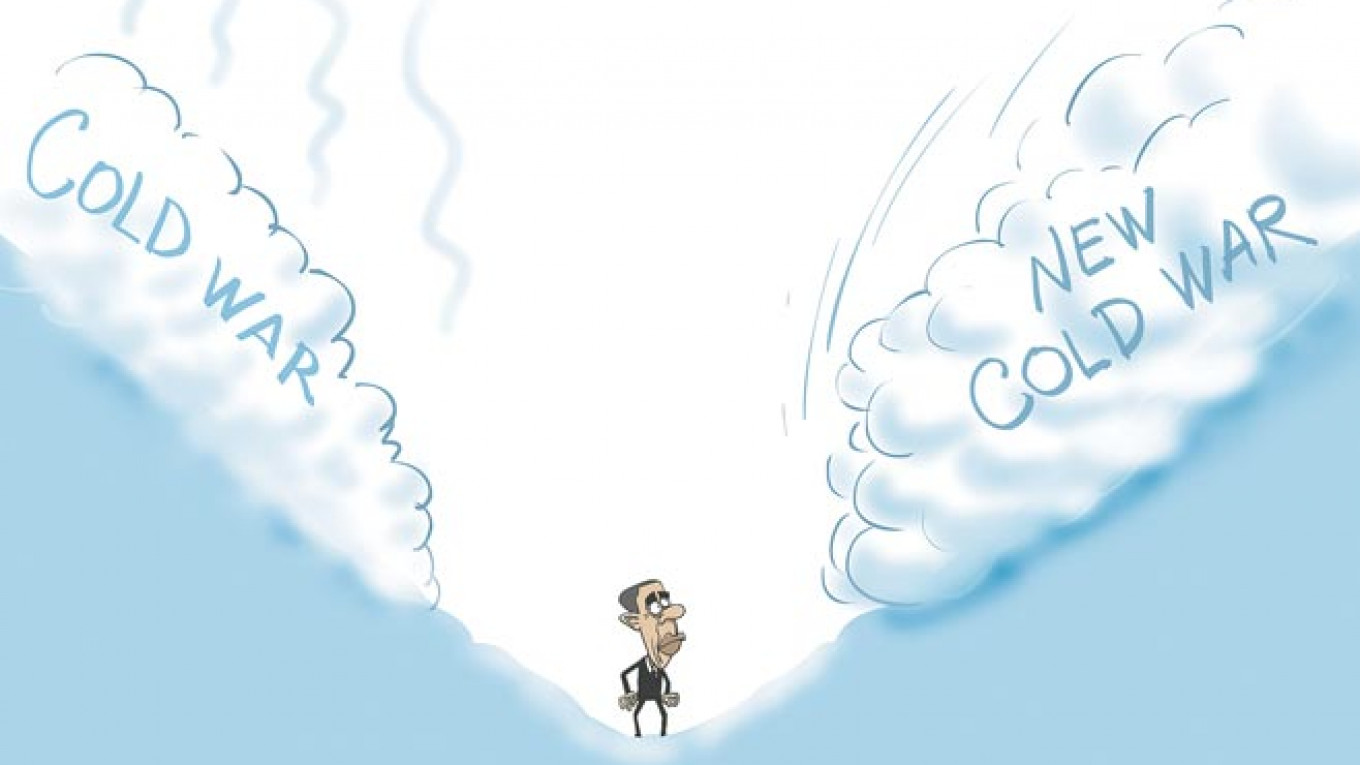The U.S. is at loss for a sound response to Russia's resurgence in Eurasia. Moscow's Crimea intervention revealed that the U.S. has no Russia policy. Washington did not anticipate the intervention, did not expect the subsequent annexation of Crimea, and did not offer a coherent response. As with Syria earlier, the White House issued some tough warnings and then failed to deliver on them.
The U.S. policy toward Russia has been stagnant since the "reset" diplomacy formulated to engage then-President Dmitry Medvedev and sideline Vladimir Putin. Now that Putin is back and on the offensive, the U.S. media and political class have rushed to offer new policies on Russia. In response to the Crimea annexation, many have proposed tough economic sanctions, arming Ukraine, and strengthening NATO.
U.S. strategic thinking is impotent. Although the world has changed since the Cold War, U.S. thinking has not.
The White House has introduced some sanctions against Russian officials and, fearful of Putin's next moves in eastern Ukraine, is ready to begin isolating Russia from the global economy both financially and commercially.
A diplomatic path could help all sides arrive at a reasonable, face-saving compromise. If diplomacy fails to deliver, however, we might be looking at an instinctive return to the same frosty relations with Moscow that followed the Soviet invasions in Czechoslovakia and Afghanistan.
But the larger question is this: What crises will the future bring, and what should the U.S. response be? The answer lies in the formulation of a long-term Russia policy.
Following the Crimea crisis, U.S. experts on Russia have offered two inter-related responses. The first is the familiar containment strategy that has been in place since the early Cold War. As Strobe Talbott, president of the Brookings Institution and a former deputy secretary of state, predicted: "If they actually annex, if a Russian tricolor goes up, this is a whole new ball game. … Containment, in a muted and modified way, will once again be the strategy of the West and the mission of NATO."
The other response also takes a page from the 20th-century confrontation with Russia and proposes an ideological struggle. As former Ambassador to Russia Michael McFaul wrote recently in an op-ed article, Putin's decision "ended the post-Cold War era in Europe" that "was defined by zigzags of cooperation and disputes between Russia and the West, but always with an underlying sense that Russia was gradually joining the international order." Casting Russia as a revisionist autocratic regime that needs an external enemy for domestic legitimacy, McFaul calls for the U.S., as during the Cold War, to engage in the ideological struggle with "autocracy."
These two options reveal the impotence of U.S. strategic thinking. Although the world has changed since the Cold War, U.S. thinking has not. Scholars have been writing extensively about an international order that is in transition from U.S.-centered unipolarity and will not return to it. In 20 years, it will be either a multipolar or a new bipolar world. In the multipolar case, several comparable powers will emerge to challenge U.S. material and ideological resources. In the bipolar world, the U.S. and China will surpass others and be the main competitors in the international system.
The U.S. will either successfully manage the transition to multipolarity by remaining an important broker and preserving even-handed relations with China, India, Russia, and others, or it will push some nations into the China camp, thereby encouraging a situation of hostile bipolarity. Unfortunately, few people of the U.S. political class are prepared to accept those realities and formulate a Russia policy grounded in them.
The administration of U.S. President Barack Obama has instinctively resisted Cold War-style recommendations, but it has nothing to offer instead. It remains fixated on Putin and his "belligerent" policies instead of thinking about the interests and values of Russia as articulated by the nation's political class. With or without Putin, Russia is not going to serve as a junior partner in a U.S.-assembled coalition no matter what sanctions are applied. U.S. thinking belongs in the past because Russia has global options.
The real choice before the U.S. is whether it wants to assist Russia in becoming stronger in a future multipolar world or push it into a China-led coalition. In a world of international politics, no other choice exists, and anything else is the fantasy of a declining American superpower.
The U.S. should rethink its whole mode of relations with Russia by recognizing the legitimacy of Moscow's many criticisms and giving it more stakes in the international system. It must provide clear assurances that the West will not expand into Eurasia. With Russia as a partner, the West can revisit issues of Ukraine's territorial integrity, European security, nuclear Iran, Middle Eastern instability, and global terrorism with a much greater likelihood for success. Without such a partnership, the currently emerging multipolar international system will be turned into a bipolar one with Russia playing on the China side.
Andrei Tsygankov is professor of international relations and political science at San Francisco State University.
A Message from The Moscow Times:
Dear readers,
We are facing unprecedented challenges. Russia's Prosecutor General's Office has designated The Moscow Times as an "undesirable" organization, criminalizing our work and putting our staff at risk of prosecution. This follows our earlier unjust labeling as a "foreign agent."
These actions are direct attempts to silence independent journalism in Russia. The authorities claim our work "discredits the decisions of the Russian leadership." We see things differently: we strive to provide accurate, unbiased reporting on Russia.
We, the journalists of The Moscow Times, refuse to be silenced. But to continue our work, we need your help.
Your support, no matter how small, makes a world of difference. If you can, please support us monthly starting from just $2. It's quick to set up, and every contribution makes a significant impact.
By supporting The Moscow Times, you're defending open, independent journalism in the face of repression. Thank you for standing with us.
Remind me later.






